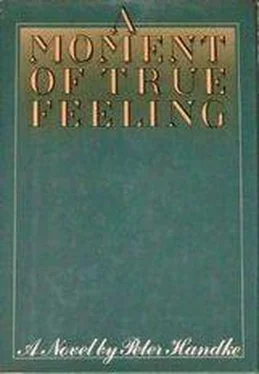Then he remembered with disgust that before putting out the light he had noticed some dried rings the water glass had left on his bedside table. He’d have to wipe them off first thing in the morning. He also thought of the dirty dishes that were still on the dining-room table. What abominable disorder the whole place was in, what a hopeless mess! That half-full can of corn in the icebox, for instance, that should have been emptied into a bowl. The phonograph records that had not been put back into their sleeves … And in the bathroom, all that hair in the brush! You’d have to be mad to conceive of a future under such conditions!
He tried to fall asleep. Maybe something new would turn up while he slept. I must become a new man! he repeated, and every muscle in his body tensed. That’s how I used to pray, he thought with surprise; my prayer consisted in silently wishing for something, with tense muscles. — He went to the window and opened the curtains.
Back in bed, Keuschnig felt that he had finally earned the right to be tired. On one of the upper floors of the house a child coughed, a long cough from deep in the chest. It must have hurt, for the child cried a little, perhaps in its sleep, and panted heavily. Keuschnig pulled up his legs and laid his hands over his face. He had never spoken to anyone in the house except the concierge couple; he didn’t even know the other occupants by sight. The clock of the Auteuil church struck the hour. The child coughed again, then called out several times for its mother. Keuschnig noticed that without meaning to he had been counting all along. He knew how often the child had coughed, what hour the clock in the belfry had struck, how often the child had called out
Still curious, he fell asleep.
His next dream was about his mother, who had been coming more and more alive in his dreams. He danced with her, rather close but side by side, avoiding frontal contact. He woke up mulling over the words “guest bed,” “north German area,” “visiting hours,” “quick trip,” “Austria cellar,” “stomach timetable,” “darling daughter,” “ginkgo tree”—all of which had been spoken that evening. Then, at the recollection of Stefanie asking in a Chinese restaurant “How’s your chop suey?”, he had to turn over on the other side to keep from vomiting. Next a dead crow fell from the winter sky and landed on a bear. Meanwhile, a big pot of jellied calves’ feet was cooking in the kitchen. Then on a steep slope he came across a dead woman, lying unburied, with black clotted blood in her open mouth, and strewed sand over her. Next he was on a stage and couldn’t remember his part, though he himself had written the play. He woke up and saw a satellite blinking in the night-gray sky as it passed the window. It’s all over, he thought, I don’t love anyone any more. Next he was in someone else’s apartment; he had forgotten to pull the chain after taking a shit, and someone else was already on his way to the toilet. Suddenly everyone was against him. All alone he was running across a quiet Alpine plateau traversed by racing cloud shadows, but they hadn’t yet started shooting at him. War had broken out again, and the last bus drove away with him, while his child was left standing in the street. When he woke up, he was drooling with fear. Next he was riding on top of a very fat woman and his pubic hair was stained with her menstrual blood. Unable to go home because he’d been involved in a million-dollar holdup, he was starting a new life with a false passport and altered fingerprints. This dream moved so slowly that he mistook it for reality. With a strange joy he found out that his case wasn’t covered by the statute of limitations and that he would have to go on living without identity for the rest of his life. An important night, he thought in a half sleep. He was good and sick of empty, incoherent awakeness. Please, one last dream, maybe it will be my salvation! — While in the apartment above him the radio was already blaring wake-up music, Keuschnig in a colorful morning dream was walking through a sunny valley, so immense, so paradisaically alive that he ached with delight. All the houses were inns; in front of them stood wooden tables and benches in softly shimmering grass, the air was balmy — at last he had found his element. Then the calves’ feet were overturned in the kitchen. A peal of thunder, and Keuschnig, forsaken by all his dreams, awoke for good under a dark sky, and he was nothing but a small, contemptible evildoer, who had instantly lost the meaning of his dreams. — So began the day on which his wife left him, on which his child was lost, on which he wanted to stop living, and on which some things nevertheless changed in the end.
Since therewas scarcely any interval between the lightning and the thunder, Keuschnig found no time to think about his dreams. For a while the morning storm gave him a feeling of home — a gloomy summer morning in the country. In the back garden of the next-door apartment a man and a woman were talking calmly and with long pauses, as though it were already evening! Or as if they were blind, Keuschnig thought. — All over the house, people were running to close windows they had just opened. Record players and radios were turned off. It began to rain, but the sound didn’t soothe him. The rain wasn’t for him; it was for other people in this foreign country. The sky wasn’t so dark any more, and that sent a disagreeable chill through him. Because he was unable to go on, his disgust, his exasperation suddenly struck him as LAZINESS, and because his laziness made him feel guilty, his nausea became worse than ever, but he was no longer convinced, as he had been, that it was justified. This guilty conscience over my listlessness, he asked himself — does it stem from my ancestry, which says: Work hard, then nothing can go wrong? Or from religion? Enough of that! His brain seemed physically to reject all attempts at explanation.
THINGS, at least, were comforting that morning: the hot water of the shower on his belly, he wished he could stay under it forever; the soft towel, in which he suddenly smelled the vinegar his hair had been rinsed in years before in another country. He decided not to shave. That was a decision and it relieved him. Then he shaved after all and strode through the apartment, proud of this second decision.
In one of the front rooms he found Stefanie, dressed in a gray traveling suit. She was sitting at a marble-topped desk, writing something in block letters. “I’m only waiting for the storm to pass,” she said. “Then I want you to call me a taxi.” She looked at him and said: “It doesn’t really matter — I’m happy, and at the same time I could kill myself, or I could just sit down and listen to records. I only feel sorry because of the child.” Her face, thought Keuschnig, looks as if she’d slept in her misery. And he also thought: She could have washed the dishes first. Horrified by her fixed animal eyes, her enlarged black nostrils, he couldn’t get a word out. “Are you sick?” she asked, as though there were a hope and she would be able to help him if at least he would say he was sick. But Keuschnig was silent. Finding nothing to say, he caught himself thinking: Maybe I should buy her a present; but what? “Call the taxi now,” she said. The phone number was another one of those THINGS he found comforting that day. The same digit — or almost — repeated over and over. Suddenly as he was listening to Eine kleine Nachtmusik and waiting for the taxi company’s switchboard to answer, Stefanie fell down — without putting out her hands to cushion the fall. He bent over her and slapped her face. As far as he was concerned, she might just as well be dead. “In five minutes,” said the operator. He couldn’t help laughing. Stefanie lay still and he, so insensible he could hardly breathe, lifted her up. He didn’t want her to go, though her presence got on his nerves. — As she was getting into the taxi, he wanted to say: I hope you come back. But the wrong words came out, and in the intended tone he said: “I hope you die.”—The sun was shining again. The sky was blue, the street almost dry. Only the tops of the cars coming from the still overcast north glistened with trembling drops of water. A broad luminous rainbow arched over the Bois de Boulogne. At a time like this, he thought, something might begin for someone else.
Читать дальше












